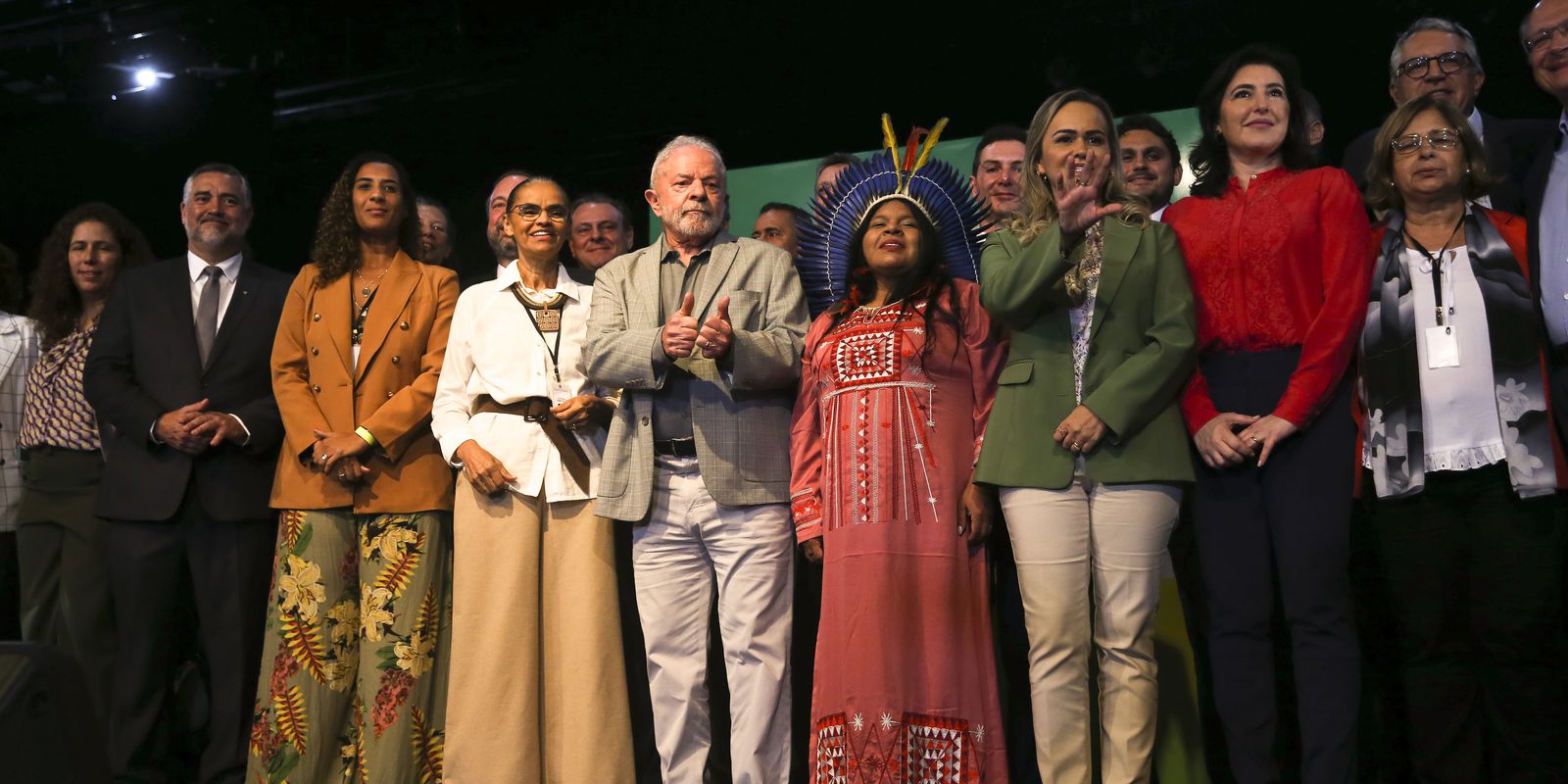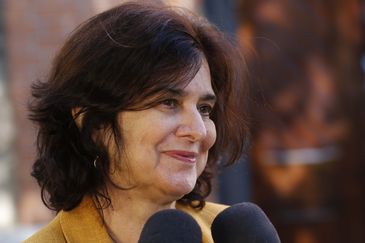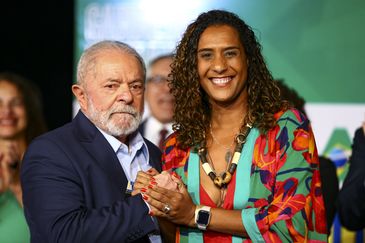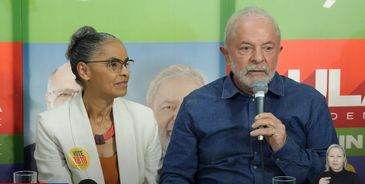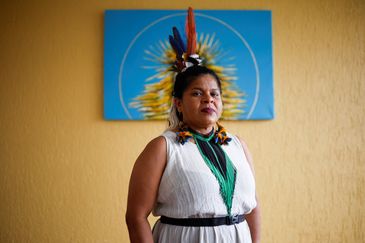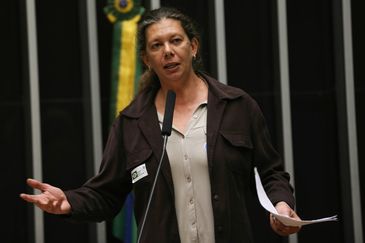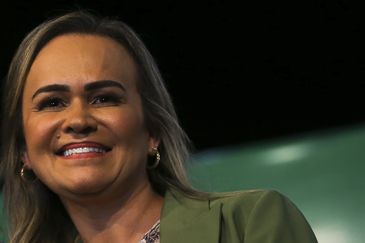President-elect Luiz Inácio Lula da Silva concluded this week the composition of the Esplanade of Ministries for his next government. Of a total of 37 portfolios, 11 will be headed by women. When he was still campaigning, Lula had already committed to increasing female participation in government.
The first six female ministers were announced by the president-elect over the past two weeks: Luciana Santos will head Science and Technology; Nísia Trindade, Health; Margareth Menezes, Culture; Cida Gonçalves, the Ministry of Women; Anielle Franco, Racial Equality; and Esther Dweck, Ministry of Management.
Another five ministers were made official by Lula this Thursday (29): Simone Tebet takes over Planning; Marina Silva, the Environment; Sônia Guajajara, Ministry of Indigenous Peoples; Ana Moser, Sport; and Daniela do Waguinho, Tourism. All must assume their posts next Sunday (1st).
Profiles
Luciana Santosthe new Minister of Science and Technology, is the national president of the PCdoB and vice-governor of Pernambuco.
An electrical engineer graduated from the Federal University of Pernambuco (UFPE), she was the state secretary for Science, Technology and the Environment and, as a federal deputy, she was a member of the Commission for Science and Technology. She will be the first woman to hold the position of Minister of Science and Technology.
Nísia Trindade she has been president of the Oswaldo Cruz Foundation (Fiocruz) since 2017. PhD in sociology and master in political science from the University Research Institute of Rio de Janeiro, she holds a degree in Social Sciences from the State University of Rio de Janeiro. Nísia led Fiocruz’s actions in facing the covid-19 pandemic in Brazil and, in the new government, takes over the Ministry of Health.
New Minister of Culture, Margareth Menezes is a singer and songwriter. She began her musical career in 1986. In 2002, she represented Brazil at the party commemorating the independence of East Timor, which brought together Lusophone-speaking singers.
In 2003, he created the Associação Fábrica Cultural, in order to contribute to the collective construction of cultural recognition in Bahia.
Cida Gonçalves She is a women’s rights activist and an expert on gender and violence against women.
Born in Campo Grande (MS), she graduated in advertising and works as a consultant in public policies on gender and violence against women. During the Lula and Dilma governments, she was the National Secretary for Combating Violence against Women. In the new management, she takes over the Ministry of Women.
Anielle Franco She is an educator, journalist and writer. Executive director of the Marielle Franco Institute, she is the sister of the former Rio de Janeiro councilor who gives the institution its name and who was shot dead in 2018.
Activist, heads the institute whose proposal is to inspire, connect and empower black women, LGBTQIA+ and peripheral people. He will command the Ministry of Racial Equality.
Esther Dweck is an economist, writer and professor at the Institute of Economics at the Federal University of Rio de Janeiro.
Between June 2011 and March 2016, she worked at the Ministry of Planning, Budget and Management in the positions of head of Economic Advisory and Federal Budget Secretary.
Takes over the newly created Ministry of Management, resulting from the division of the current Ministry of Economy.
New Minister of Planning, Simone Tebet is a Brazilian lawyer, professor and politician affiliated with the MDB. Currently, she is a senator for the state of Mato Grosso do Sul, where she was also a state deputy, government secretary and vice-governor. She was chairman of the Senate Constitution and Justice Committee (2019-2020 biennium), considered one of the most important in the House.
Marina Silva is a historian, teacher, psychopedagogue, environmentalist and Brazilian politician affiliated to the Network. Throughout her political career, she was a senator for Acre and Minister of the Environment between 2003 and 2008. She ran for President of the Republic in 2010, 2014 and 2018. In 1996, she received the Goldman Environmental Prize. She returns to command the Environment folder.
Sonia Guajajara is a Brazilian indigenist leader of the Araribóia Indigenous Land, in Maranhão. Graduated in Literature and Nursing, postgraduate in special education and federal deputy, she was coordinator of the Articulation of Indigenous Peoples of Brazil and candidate for vice president in 2018 by PSOL.
She is the first indigenous woman in the country to hold the position of minister. She will head the newly created Indigenous Peoples portfolio.
Ana Moser is a former athlete, Olympic volleyball medalist and social entrepreneur. For 20 years, she has chaired the Instituto Esporte e Educação, a civil society organization whose objective is to implement the methodology of educational sport in low-income communities. She was part of the elected government’s transition team and will lead the previously extinct Ministry of Sports.
Daniela Moté de Souza Carneiro, known as Daniela do Waguinho, is an educator and federal deputy re-elected by Rio de Janeiro as the most voted in the state. Affiliated with União Brasil and married to the mayor of Belford Roxo, in Baixada Fluminense, Wagner dos Santos Carneiro, known as Waguinho, was municipal secretary of Social Assistance and Citizenship. She will lead the Ministry of Tourism.
Other women
The future Minister of Finance, Fernando Haddad, announced this Friday (30) two women to preside over the main Brazilian public banks.
Tarciana Medeiros takes over Banco do Brasil and Maria Rita Serrano, Caixa Econômica. Both are career employees of the institutions they will preside over.
Tarciana Medeiros has a 22-year career at Banco do Brasil. Now, she becomes the first woman to chair the bank in the institution’s more than 200-year history, which was founded during the Empire, in 1808. She currently holds the position of executive manager in the Clients department. Previously, she was commercial superintendent at BB Seguridade, a subsidiary of the bank. Graduated in business administration, she has a postgraduate degree in management, marketing, leadership and innovation.
Rita Serrano has been with Caixa Econômica Federal for 33 years, being the current representative of employees elected to the Board of Directors of the state-owned bank, a position she has held since 2014. Among several functions, she was, from 2006 to 2012, president of the ABC Bank Workers Union Paulista. Currently, she is one of the leaders of the public companies defense movement.
